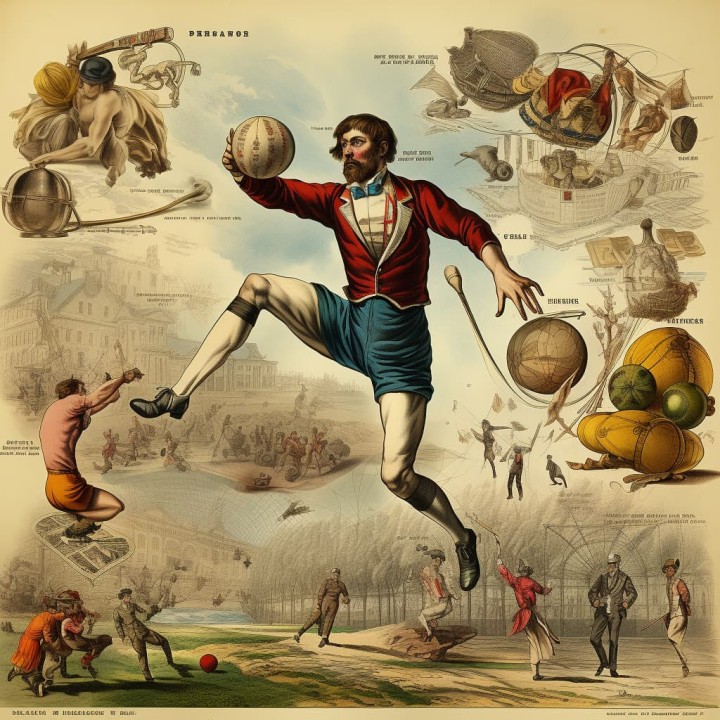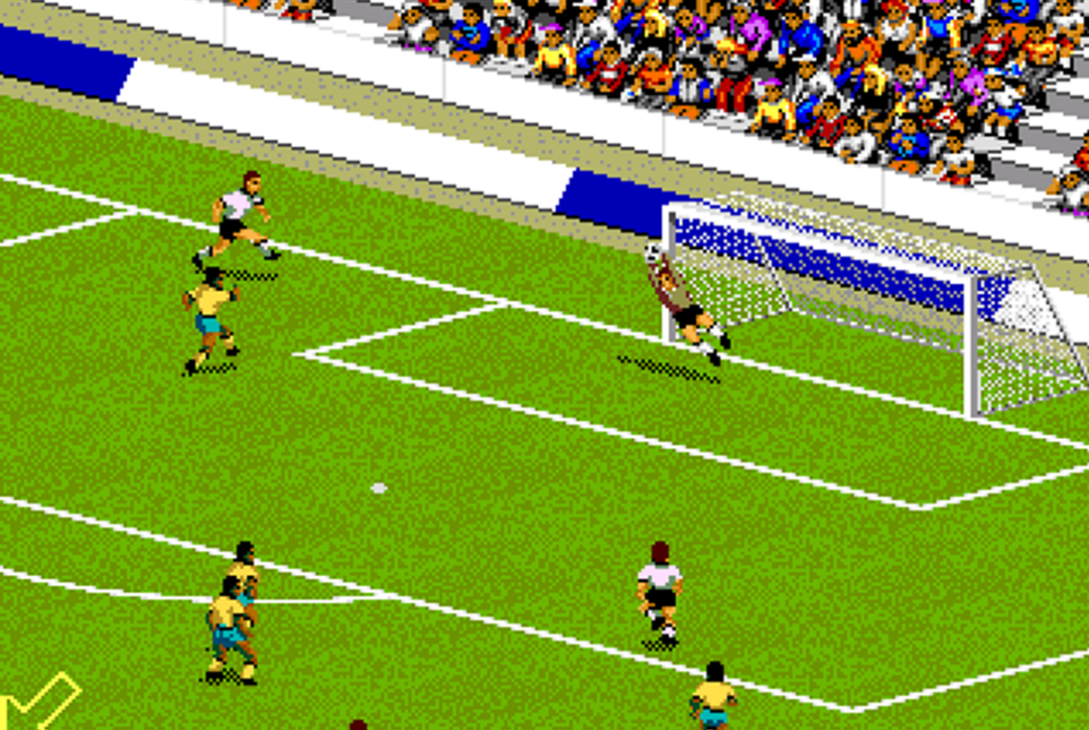The history of football dates back over 2,000 years, with its roots in ancient China. The modern game, however, began in 19th-century England.
Football boasts a rich history that spans cultures and continents. Ancient civilizations like the Chinese, Greeks, and Romans played games involving a ball and feet millennia ago. These games varied widely, reflecting the customs and rules of the times, but laid a foundation for the contemporary sport’s values of teamwork and competition.
In the mid-19th century, England became the birthplace of modern football when schools and clubs standardized the divergent rules. Football quickly spread globally, becoming one of the world’s most popular sports, with its governing body, FIFA, established in 1904. This sport enthralls millions, with events like the World Cup embodying its universal appeal and excitement. Football not only serves as a unifying force among fans but also contributes significantly to local and global economies through sponsorships, merchandise, and broadcasting rights.

Credit: online.jwu.edu
The Origins Of Football
The game we call football has a rich history that spans many centuries and cultures. At its heart, football is about moving a ball, by foot, toward an opposition’s territory. Over time, various forms of the game evolved, and by the 19th century, modern football began to take shape with established rules and structure.
Early Ball Games Across Cultures
Throughout history, civilizations have engaged in ball games that echo today’s football. These early versions displayed a world united in the spirit of competition and joy of play.
- Cuju – An ancient Chinese game, seen as a precursor to football, where players kicked a ball through an opening.
- Harpastum – The Romans played this, carrying and passing a smaller ball.
- Calcio Fiorentino – This Italian Renaissance game mixed soccer, rugby, and wrestling.
Codification Of Rules In England
The game’s rules were as diverse as its players until England set a common standard. Schools and clubs each played by their own guidelines until then. Football morphed into a structured sport with the formation of these universal rules.
| Year | Event |
|---|---|
| 1848 | First recorded rules at Cambridge University |
| 1863 | Formation of The Football Association in England |
| 1871 | Introduction of the FA Cup, the first football competition |
Over the years, references to “association football” were shortened to the colloquial “football.” This laid the groundwork for today’s global game loved by millions.

Credit: www.linkedin.com
From Mob Football To Modern Game
The journey from chaotic mob football to the structured modern game traces a fascinating history. This evolution shaped how the sport is played and loved globally today. Let’s dive into this transformation.
Medieval Chaos To Organized Play
The origins of football seem murky, yet one thing is clear—it began as mob football. This form of the game was wild and widespread, with entire villages clashing in a chaotic contest. Picture hundreds of players chasing a pig’s bladder across town!
- Rules were absent.
- Streets and fields turned into playgrounds.
- Games stretched for miles and could last days.
Local festivals often featured mob football. It was a rough, unorganized sport that sometimes led to injuries and even riots. As times changed, so did the need for a more structured game.
Influence Of British Schools
The modern game owes much to British public schools of the 19th century. These institutions became the cradle for the organized sport. Football rules started to take shape in schoolyards.
Schools began crafting their own rules. These varied widely from one institution to another. Rugby School favored carrying the ball, while Eton College promoted dribbling.
| School | Football Style |
|---|---|
| Rugby School | Running with the ball |
| Eton College | Focus on dribbling |
Interschool competitions pushed for a unified set of rules. Schools eventually came together to agree on regulations, leading to standardized play. The Cambridge Rules, first drafted in 1848, were a significant step forward.
The Football Association formed in 1863, marking the official birth of modern football. This governing body penned the original rules which gave us the game we recognize today.
The Spread Of Football Abroad
The game of football did not stay within the UK for long. Its popularity and simplicity made it a prime sport for international export. British workers, merchants, and soldiers carried the game with them as they traveled and settled abroad. This led to the widespread adoption of the sport across continents, ultimately shaping it into the global phenomenon we know today. Teams formed, leagues established, and rivalries born, football’s roots dug deep into foreign soils, each one adding its unique cultural flair to the game.
British Expats And The Global Game
British expatriates played a crucial role in introducing football to the world. In the late 19th and early 20th centuries, British citizens living abroad organized matches, forming clubs and leagues, particularly in:
- South America: Teams like Argentina’s River Plate and Brazil’s São Paulo FC have British origins.
- Mainland Europe: Clubs including AC Milan in Italy and Genoa CFC, originally formed by British expats.
These early football communities sowed the seeds for what would become passionately followed national leagues and international competitions.
Adaptations And Regional Differences
As football took root in different cultures, distinct regional styles and rules began to emerge. This diversity helped shape the game’s evolution while challenging players and fans to adapt. Some key differences include:
| Region | Adaptations |
|---|---|
| Latin America | Emphasis on flair, dribbling, and individual skill |
| Africa | Physical, fast-paced play with strong community involvement |
| Asia | Technical skill and strategy with growing domestic support |
These adaptations ensured that football remained locally relevant while maintaining the basic rules that offer a shared global experience.
Rise Of Football Associations
The ‘Rise of Football Associations’ marks a pivotal era where football evolved from casual play to organized sport. Groups formed to govern rules, competitions, and standards. This shift brought structure to the beautiful game.
Formation Of The Fa And Fifa
In 1863, the Football Association (The FA) became the first governing body of football. It unified various forms of the game. Clubs agreed on common rules, setting a foundation for global football standards.
The International Federation of Association Football (FIFA) was founded in 1904. Representatives from France, Belgium, Denmark, the Netherlands, Spain, Sweden, and Switzerland came together. They aimed to oversee international competition rules beyond English influence.
Standardizing The Laws Of The Game
With diverse games across regions, standardization was critical. The FA Laws of the Game were established to align teams on how football should be played. Over time, FIFA adopted and spread these standards worldwide.
- Standard pitch sizes
- Defined playing time
- Offside rule clarification
- Introduction of referees
Teams and leagues from different countries could now compete fairly. This standardization cultivated football’s global appeal and helped pave the way for international tournaments. It instituted a uniform code still upheld in modern football.
Evolution Of Football Competitions
The game of football has seen dramatic changes since its early days. From casual kickabouts to formal competitions, the evolution of football tournaments tells a story of passion, community, and global unity. Let’s explore how competitive football began and grew to the worldwide phenomenon it is today.
First Football Tournaments
Competitive football started in schools and universities. They played these early matches with varied rules. Over time, standard rules developed. The first official football competition was the English FA Cup in 1871. It was a groundbreaking event, welcoming amateur teams to showcase their skills.
- FA Cup: Started in 1871.
- Football League: Formed in 1888, it was the first league competition.
- International Competitions: These began in 1883.
Birth Of The World Cup
Football snowballed from national tournaments to international celebrations. In 1930, the first World Cup took place in Uruguay. This event marked a new era, with nations around the globe competing for football’s highest honor.
| Year | Event |
|---|---|
| 1930 | FIFA World Cup inaugurated in Uruguay. |
| 1958 | UEFA European Championship announced. |
The World Cup introduced legends and unified fans. It remains the most prestigious football competition.

Credit: digitaldaze.io
Game-changing Innovations
Football thrives on innovation. It evolves, captures hearts, challenges minds, and most importantly, it adapts. Game-changing innovations have shaped football into the thrilling sport we love today. Let’s explore some of the most pivotal moments in football history.
Introduction Of The Offside Rule
The offside rule is a game-changer. In 1863, it was born. This rule makes teamwork a must. Players must think fast. They must work together. No longer can a player wait near the goal to score. They must be inline. The offside rule changed football strategies forever.
- Offside position: when a player is nearer to the opponent’s goal line than both the ball and the second last opponent.
- Active play: involved in the game through action or impact.
- Penalty: Consequences for not following the rule make the game fair.
The offside rule means skills shine. Long passes count. Goals feel earned. Fans stay on edge watching. Football without this rule? Unthinkable now.
Development Of Football Equipment
Safety and performance step up with better gear. In the 1870s, the first football boots appeared. They were heavy, but they were the start. The journey from leather helmets to advanced shin guards shows progress.
| Equipment | Change | Impact |
|---|---|---|
| Boots | From heavy leather to lightweight materials | Speed and agility grow |
| Ball | Improvement in shape and material | Better control and precise shooting |
| Kit | Moisture-wicking fabrics | Athletes stay dry and comfortable |
| Shin Guards | Advanced protection | Less injuries, more dynamic play |
Eye-catching jerseys and durable balls are a norm today. Each advance keeps players safe. It helps them do their best. Can you imagine modern football without these innovations? Clearly, these changes were not just necessary, they were game-changing.
Icons That Shaped The Game
The history of football is dotted with extraordinary individuals whose brilliance on and off the field has left an indelible mark on the game. These icons not only defined generations but also inspired masses with their skills, leadership, and memorable performances. Let’s delve into the legends who shaped the beautiful game.
Legendary Players And Coaches
Football is not just a game, it’s a series of stories told through the lives of those who played it with heart and soul.
| Player | Country | Achievements |
|---|---|---|
| Pelé | Brazil | 3 World Cups |
| Diego Maradona | Argentina | World Cup ’86 |
| Mia Hamm | USA | 2 World Cups |
- Coaches like Sir Alex Ferguson shaped teams into champions.
- Johan Cruyff brought a new playing philosophy to the field.
Memorable Matches That Made History
Some football matches live forever in the hearts of fans.
- 1950 World Cup Final: Uruguay’s triumph over Brazil.
- 1966 World Cup Final: England’s historic win on home soil.
- The Miracle of Istanbul: Liverpool’s 2005 Champions League comeback.
These epic showdowns showcased football’s unpredictability and excitement.
Football In The Modern Era
The ‘Football in the Modern Era’ has seen remarkable changes that transformed how we enjoy and engage with the sport. Dive into the game’s current landscape as we explore the surge of technology’s impact and anticipate the exhilarating possibilities for football’s future.
Impact Of Technology
Technological advancements have reshaped football from grassroot levels to grand stadiums. Instant replays and VAR (Video Assistant Referee) now offer more fairness in game decisions. GPS vests help to monitor player performance during training and matches. Digital platforms provide fans 24/7 access to content and statistics about their favorite teams and players.
- Goal-line Technology: ensures accuracy in scoring.
- Data Analytics: optimizes team strategies.
- Fan Engagement: mobile apps enhance the viewing experience.
The Future Of Football
Imagine a world where every aspect of football is interconnected. We aren’t far from that reality. AI coaches could soon provide personalized training programs. Biometrics may dictate player selections. Even the way we watch games might completely change with virtual reality implementations.
Fans might soon select camera angles, stream matches in VR, or even feel the energy of the game through haptic suits. Player health will see improvements with wearables that predict and prevent injuries. Sustainability efforts are also changing stadium designs and operations, leading to a greener future for football.
| Technological Change | Potential Impact |
|---|---|
| Wearable Technology | Sophisticated player health tracking |
| Virtual Reality (VR) | Immersive fan experiences |
| Eco-Friendly Stadiums | Reduced environmental footprints |
Frequently Asked Questions For History Of Footballgame
Who Invented The Game Of Football?
Modern football has evolved over time, but the Football Association in England is credited with formalizing the game’s rules in 1863. Various forms of football existed before, but the FA’s codification marks the sport’s official birth.
How Did Football Start And Why?
Football originated in England around the 12th century as a folk game. It started from a desire for village communities to compete using a ball and simple rules.
What Is The First Real Football Game?
The first real football game took place in 1869 between Rutgers and Princeton, with Rutgers winning 6-4.
When Was The First Nfl Game In History?
The first NFL game took place on October 3, 1920. The Dayton Triangles defeated the Columbus Panhandles 14-0.
Conclusion
Through the ages, football has evolved, captivating hearts worldwide. Its rich history showcases humanity’s love for competition and community. As we reflect on the journey of this beloved sport, we’re reminded of its unifying power and timeless appeal. Embrace football’s past and revel in its future; the game continues, as does its legacy.




